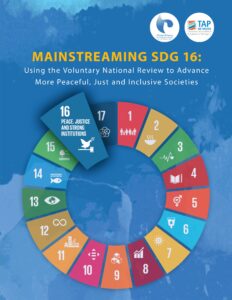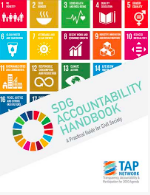Parliament’s core functions – lawmaking, budgeting, oversight and representation – can play a key role in advancing the SDG16+ agenda for peaceful, just and inclusive societies
Parliaments can play a key role in supporting SDG16+ implementation, as well as ensuring accountability for commitments to create more peaceful, just and inclusive societies. The 2030 Agenda recognizes “the essential role of national parliaments through their enactment of legislation and adoption of budgets and their role in ensuring accountability for the effective implementation” of commitments.1 Composed of representatives from different geographical areas or constituencies, national parliaments – or legislatures – generally have the following core functions and responsibilities:

All of these functions can contribute to building peaceful, just and inclusive societies. Most countries require parliamentary approval in order to pass legislation that supports SDG16+ implementation. Notably, several SDG16+ targets or indicators – namely indicator 5.1.1, target 5.c, target 10.3 and target 16.b – explicitly require legislation for their successful implementation. Parliament’s role in analyzing and approving budgets is also crucial in order to ensure adequate allocation of financial resources for SDG16+ implementation. By ensuring transparency and the effective use of financial resources by governments, parliaments also play an important role in combatting corruption in the public sector (SDG target 16.5).
By providing oversight of government implementation of the SDGs, parliaments directly support SDG target 16.6 (effective, accountable and transparent institutions). Their oversight function is also critical for monitoring SDG16+ progress and ensuring overall accountability for SDG commitments. Importantly, parliament’s role in representing the interests and views of citizens – including vulnerable and marginalized groups – is at the heart of SDG target 16.7 (responsive, inclusive, participatory and representative decision-making). The gender composition of national parliaments is also one of the key indicators for gender equality (SDG target 5.5).
There are a number of ways that you can engage with parliaments and parliamentarians to advance the SDG16+ agenda, including the following actions:
1. Engage with individual Members of Parliaments (MPs) – You can seek to meet and build relationships with MPs in order to advance SDG16+. In particular, you can:
a. Educate MPs on the SDG16+ agenda and the role they can play to support SDG16+ implementation and accountability – In addition to meeting with individual parliamentarians to discuss the SDG16+ agenda, you can organize awareness-raising sessions, workshops or roundtables on SDG16+ for groups of parliamentarians;
b. Encourage MPs to legislate to support SDG16+ implementation – For example, you can urge MPs to ensure that current laws are consistent with the aims of SDG16+, as well as to propose or support new legislation that advances specific SDG16+ targets;
c. Encourage MPs to review budgets through an SDG16+ lens – In particular, you can urge MPs to ensure that your country’s annual national budget provides for a sufficient and effective allocation of resources for SDG16+ implementation;
d. Encourage MPs to monitor, review and report on progress on SDG16+ – You can encourage MPs to provide regular reports on SDG progress to parliament. You can also urge MPs to use existing parliamentary processes – such as open debates, ‘question time’ or ‘interpellations’3 – to question government ministers on the implementation of the SDGs and to draw attention to particular SDG16+ issues; and
e. Urge MPs to take into account the interests, needs and views of vulnerable and marginalized groups – You can urge MPs to ensure that the views and situations of those furthest behind are considered in carrying out legislative, budgetary, oversight and representation functions.
TIP: Engaging with individual Members of Parliament (MPs): 

TIP: Engaging with individual Members of Parliament (MPs):
2. Engage with parliamentary committees and working groups – You can seek to engage with parliamentary committees – both permanent standing and ad hoc committees – that address SDG16+ issues. As a starting point, you should determine whether there is a dedicated committee or working group on the SDGs, as well as which committees address particular SDG16+ issues as part of their formal mandates.4 To engage, you can:
a. Educate committees on SDG16+ through information sessions and workshops;
b. Encourage influential parliamentary committees to focus on SDG16+ issues;
c. Provide briefings, feedback and/or oral or written submissions to parliamentary committees overseeing or reviewing SDG16+ implementation; and
d. Offer technical advice and expertise on SDG16+ issues.
TIP: 

TIP:
You can also support the creation of informal cross-party mechanisms – such as parliamentary friendship groups – to focus on specific SDG16+ issues or targets.5
3. Participate in parliamentary hearings and inquiries – You can provide oral or written submissions to public hearings and inquiries on SDG16+ implementation, follow-up and review.6 Parliamentary committees often have the power to call public hearings to gather citizens’ views on implementation, as well as to call on government officials to provide information on the impact of their policies.7 Public hearings can also offer a mechanism for parliaments to receive citizens’ input on draft or existing legislation in relation to a particular SDG16+ issue, especially from vulnerable and marginalized groups.8
4. Connect citizens and parliamentarians – Given that ‘inclusion’ is at the heart of SDG16+, you can also assist in bridging the gap between parliamentarians and citizens. Facilitating regular dialogue between citizens and parliamentarians can help to advance SDG16+ by providing local insights on implementation, which can help identify gaps and weaknesses that may not be apparent in general government reports or national statistics.9 Efforts to connect citizens and parliamentarians can include organizing lobbying campaigns (including letter-writing campaigns), arranging constituent visits in parliamentarians’ electorates or districts, supporting citizen participation in parliamentary hearings and inquiries, and hosting local forums where citizens and parliamentarians can discuss SDG16+ issues.
TIP: Innovative ways to engage parliaments: Using technology to put SDG16+ into practice 

TIP: Innovative ways to engage parliaments: Using technology to put SDG16+ into practice
There are innovative ways to engage with parliamentarians in order to advance SDG16+, including through the use of digital platforms such as social media and mobile and SMS technology. Many parliaments are adopting the use of digital technologies as a low-cost way to reach citizens in certain geographic locations or who lack the means to participate in parliamentary processes in-person.10 The use of these technologies is increasingly common as a result of the COVID-19 pandemic. Digital technologies can be effectively used by CSOs and citizens alike to offer direct feedback to parliamentarians on SDG16+ implementation and review, provide comments on draft legislation, and submit letters or questions to elected representatives in a public forum.
Case Study


Case Study
Ensuring Institutional Memory of SDG Work through Relationship-Building Efforts with National Parliamentarians
SDG Accountability Handbook
In June 2017, Sierra Leone Coalition 2030, a civil society alliance for the SDGs, held a capacity-building retreat with 25 MPs. The training targeted the most strategic figures in parliamentary work on the SDGs: members of the informal Parliamentary Action Group on the SDGs and parliamentary leadership, including the Deputy Speaker and the Majority Leader. In order to maintain institutional memory beyond the electoral term, the training also engaged parliamentary clerks. The participants expressed the need to gain more knowledge on the SDGs to better carry out their representation, oversight and monitoring functions. In addition to providing technical capacity, the training was also used as an opportunity to develop a memorandum of understanding for continuous engagement between the civil society alliance and members of the Parliamentary Action Group on the SDGs.11
Mainstreaming SDG 16: Using the Voluntary National Review to Advance More Peaceful, Just and Inclusive societies (Global Alliance and TAP Network, 2020)
This resource provides policy guidance, case studies and good practices on advancing SDG 16 implementation at national and subnational levels by more effectively leveraging the Voluntary National Review (VNR) and post-VNR processes. It contains a chapter on ‘The Role of Parliament and Parliamentary Committees.’
Available at: https://www.sdg16hub.org/topic/mainstreaming-sdg-16-using-voluntary-national-review-advance-more-peaceful-just-and-inclusive

SDG Accountability Handbook: A Practical Guide for Civil Society (TAP Network, 2018)
This handbook provides guidance on the different approaches and steps that can be taken by civil society to ensure national government accountability for the SDGs. It includes a chapter on ‘Mobilizing Parliamentarians.’
Available at: https://sdgaccountability.org/

This handbook aims to provide guidance to civil society organizations on how to engage with parliaments and parliamentarians to promote, support and track the implementation of the 2030 Agenda. The full version is available in English. Abbreviated versions are available in English, French and Spanish.
Available at: https://www.together2030.org/wp-content/uploads/2018/07/Engaging-parliaments-on-the-2030-Agenda-and-the-SDGs.pdf
This self-assessment toolkit provides parliaments with the framework to evaluate their readiness to engage on the SDGs. It seeks to help parliamentarians identify good practices, opportunities and lessons learned on how to institutionalize and mainstream the SDGs into the legislative process. Available in 13 languages.
This handbook is designed to be an easy-to-use resource to help parliamentarians and parliamentary staff members play an effective role in implementing the SDGs. It introduces the 2030 Agenda and lists good practices and tools from around the world that can be adapted to different national contexts. Available in English, Arabic and Russian.
This short brief – based on responses from 89 parliaments to a global survey sent by the IPU in 2018 – outlines how parliaments are engaging with and institutionalizing the SDGs.
Available at: https://www.ipu.org/sites/default/files/documents/final_-_survey_analysis_updated_feb_14_2019_edited-e.pdf
This report – based on contributions from over 150 parliaments – offers in-depth research and analysis on the current state of parliamentary oversight and ways to strengthen it. It provides examples of how parliaments and MPs carry out oversight in their countries, tips for MPs and recommendations on strengthening parliamentary oversight. Available in English, French, Spanish, Arabic and Serbian.
Transparency, Accountability &
Participation (TAP) Network
Address: 205 E 42nd St.
New York, NY 10017
Email:
secretariat@tapnetwork2030.org